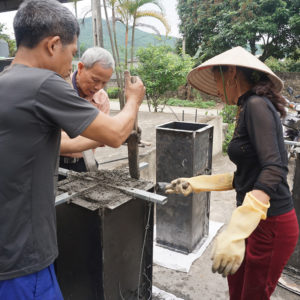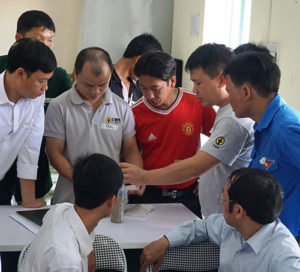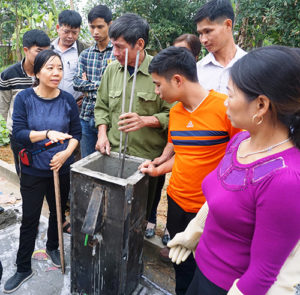I met Nguyen Thi Thu on a gray morning when I joined a NEW IDEA-supported workshop about biosand water filtration. NEW IDEA is our largest program in Vietnam, and the three-day workshop was hosted by CWS in partnership with the Dai Tu Health Center. By the time I visited, hands-on teaching and learning was underway with a session in the Center’s backyard where 20 people were busy mixing concrete. What surprised me was the number of female participants, among which I noticed a woman with a trowel in hand and scooping concrete into a biosand filter mold.
Mrs. Thu is 59 years old, and she leads her village ‘elderly club’. (Yes, in Vietnam, people her age are considered elderly!). When we spoke, she told me, “Like many other villages in Vietnam’s rural areas, mine does not have clean, piped water. People use water from a hand-dug or mechanically-drilled well, which is just few meters deep, or from a gravity-fed source. But we always worry about the quality of the water from all sources, as it is contaminated by chemical fertilizers that people are overusing for farming nowadays and by animal waste.” To protect her own family’s health, she added, “I bought an imported water filter for 5 million Vietnamese Dong ($220). This is a big investment, that also requires frequent filter replacement that makes it costs more. So obviously it is not suitable for poor families.”
Never having heard of biosand water filters before, Mrs. Thu joined the NEW IDEA 2 training course to become a biosand filter promoter in her village. Now, she is completely convinced of its filtration capacity and, importantly, its low cost to create and maintain. Each biosand filter only costs about $25 US to build.
Having joined all workshop sessions to get a full understanding of the model and its operation, and hands-on experience in building a filter, she can now explain it well to other people in her club, her whole village and even her own family. “I will still make one for my family as it quite small, affordable, easy use and to maintain. I will build it in front of my home so other people can see it and try a drink … and then I can explain better about it.”
In thinking of my time with people like Mrs. Thu, who is always thinking of others, I have no doubt that the lives of people in her Phu Thinh village will be easier, not only on water access, but in many other aspects.
NQ Dung is the CWS Country Representative in Vietnam.



